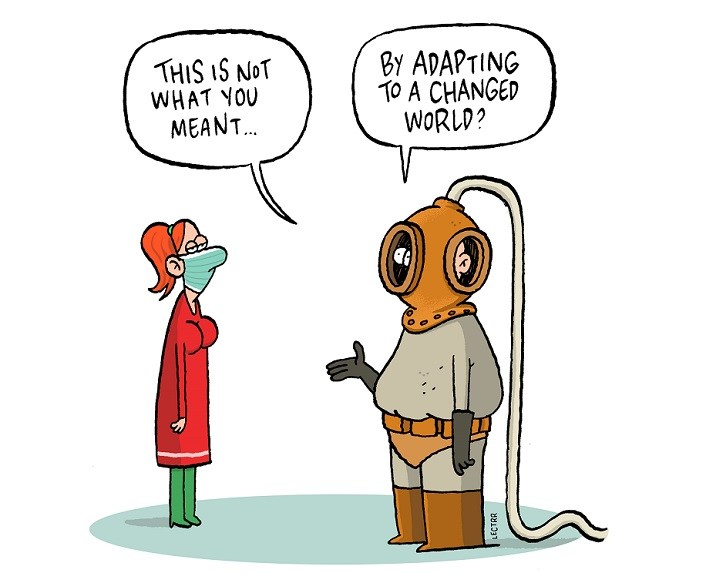It has been a miserable year so far. Not only has the coronavirus killed hundreds of thousands Europeans, it has also confined the rest of us to our homes and ravaged the economy. And as autumn days get colder and shorter and Covid-19 cases surge, a dismal winter looms. When will this nightmare ever end?
The hope is that a vaccine will be forthcoming soon. Scientists around the globe are racing to develop one. Regulators are fast-tracking approval processes. While it is not yet clear whether any particular vaccine will prove to be safe and effective, pharmaceutical companies are preparing to crank up production of many promising candidates. Governments are creating a market for them by placing big orders in advance.
If at least one of these bets pays off soon, 2021 will be a much happier year. We will finally be free to hug elderly relatives, socialise with both friends and strangers, move around as we please, and get back to work more or less normally.
But what if none pay off? The uncertainty about whether a vaccine is likely to be developed sooner or later (or, indeed, never) is not just a matter of timing – of how long we may need to put up with economic, social and medical disruption. It also impinges on government strategy: of what the appropriate response to Covid-19 ought to be. A relatively brief disruption demands different government interventions than a prolonged pandemic, let alone a permanent one.
The right response to a short, sharp shock, such as the three-month lockdowns most of Europe has recently experienced, is to put the economy on temporary life support while controlling the disease, then to apply massive stimulus to jolt activity back to life once the sickness abates.
That is more or less the strategy that most European governments are following. They are providing generous grants to support workers’ incomes in their current jobs, whether they are working reduced hours or none. And they are offering ample funding to existing businesses to help tide them over tough times.
Looking forward, European governments are planning large public investment programmes, primarily at a national level but also at EU level through the new €750 billion recovery and resilience fund. And they are borrowing freely to pay for it all. In effect, governments are seeking to insure society as a whole against the huge but hopefully temporary costs of the pandemic, and then to set the economy on a more sustainable future course.
For now, governments have plenty of leeway to continue supporting corona-stricken economies. Eurozone fiscal rules have been suspended this year and are likely to remain so next year too. And even though governments are borrowing at levels unprecedented in peacetime, they can issue debt extremely cheaply. The interest rate on ten-year German and French government bonds is negative, while even Italy can borrow for ten years at only 1%. Allowing for inflation, the real interest rate that governments are paying is even lower. With borrowing costs remain so low, they can comfortably sustain much higher debts than before.
Moreover, the era of cheap debt looks set to last for a while. With economies depressed and inflation subdued, government bonds remain a relatively attractive investment for those seeking a safe haven for their cash. The European Central Bank (ECB) is also aggressively buying government bonds, quelling any incipient fears about excessive borrowing and holding interest rates down. More broadly, interest rates have been on a declining trend for nearly four decades for a variety of reasons, from population ageing to wealth inequality, that seem set to endure for now.
With us forever?
Provided a coronavirus vaccine is found soon, European governments’ current strategy is both desirable and feasible. But imagine a much gloomier scenario in which the coronavirus pandemic becomes a permanent feature of our lives for the foreseeable future. While governments, working in lockstep with central banks that can create currency at the click of a mouse, have impressive powers, they do not have infinite ones. They can’t insure everyone against a permanent loss of income – and if they try to do so, inflation will eventually result.
If we were cursed with the coronavirus for the foreseeable future, we would need instead to adjust to our new circumstances. Among many other things, instead of supporting workers in their current jobs and propping up existing businesses in their current lines of work, governments would need to encourage and help both workers and businesses to adapt.
Consider a future where online shopping increasingly replaces physical stores. It would then make little sense for governments to provide, or guarantee, ever larger loans to dying businesses that will never be able to repay them. Those that were no longer viable would need to close. Retail employees would need help retraining and finding new jobs, with generous unemployment benefits in the interim.
Societies would adapt too, of course. While the old and sick would require additional protection, younger, healthier people would doubtless learn to live with a higher risk of coronavirus infection. Just as societies do not grind to a halt during winters in which influenza deaths spike, many people would get on with life much as before – though wearing face masks could become the norm, as it has been in Asian cities since the SARS epidemic in 2002–4.
Prolonged but not permanent
The trickiest scenario – which is perhaps likelier than many people think – is an intermediate one in which the pandemic is prolonged, and with it the depression, but where hopes of a vaccine and a return to “normality” are forever just around the corner. In such circumstances, should governments continue to subsidise existing jobs and existing businesses at increasing cost, or should they encourage the economy and society to adjust? When does seeking to freeze the economy in its pre-coronavirus state stop being desirable? When might it no longer be feasible?
Many European governments’ temporary support measures are already becoming extended ones. Both the German and the French governments are pledging to continue supporting people in their existing jobs for at least two years. Germany is extending forbearance against insolvency for companies with excessive debts until the end of 2021. But for how long is such support really wise? If the coronavirus is still with us after two years, should governments extend such schemes even further?
Even in normal times, economies tend to change a lot in two years, let alone three or four. New digital technologies spread, more climate-friendly alternatives are developed, consumer tastes change and much else. Two years after the launch of Apple’s iPhone in the summer of 2007, Nokia phones were already on the ropes; imagine the futile cost of propping up Nokia workers in their pre-iPhone roles. Two years from now, Germany’s dirty diesel car producers may likewise be fading in the face of hybrid and electric alternatives; should those businesses be subsidised too?
Moreover, the coronavirus has greatly accelerated the adoption of new technologies, from robots and 3D printing to video-conferencing. If the latter is going to permanently replace much business travel, should governments really be bailing out airlines in their current form – or rather encouraging them to shrink, merge and reorganise their operations, and allowing some to close?
Some might argue that governments should protect jobs impacted by coronavirus but not those affected by broader trends, yet how does one readily distinguish between the two?
Even in sectors such as restaurants where technological change is minimal and future demand is likely to bounce back – Europeans are almost certain to want to eat out in large numbers at some point in future – open-ended support may be a mistake. If social distancing lasts two years or more and many restaurants are unprofitable in the interim, their staff could be doing something more valuable in the meantime, with the option of returning to the sector when it picks up again.
Even in good times, many restaurants open and close each year. And while many (including myself) would be sad to see much-loved restaurants close, new ones can easily open once the pandemic passes. Unless governments extend a blank cheque to all restaurants, even those that might be viable again in future will eventually become insolvent. Should governments prop up zombie companies indefinitely?
More broadly, at some point the ability or willingness of governments to borrow, of central banks to create money and of investors to amass ever more government debt will abate. This might happen sooner in a country such as Italy with very high public debt. But even in Germany – which is rightly borrowing freely to support the economy at the moment – there is a limit. If the coronavirus crisis lasts several years, even Germany will start looking increasingly Italian.
Merely raising such thorny issues is controversial. European workers and businesses are not to blame for the coronavirus; why should they suffer through no fault of their own? Many politicians will be tempted to duck difficult choices and keep existing support going in the hope that a vaccine eventually turns up.
Let’s hope it does. But if it doesn’t, we ultimately need to accept that the world has changed and adapt to it.
The choice, then, would not be between generous open-ended support and heartlessly cutting workers and businesses loose. It would be between seeking to deny the reality of stagnation and insolvency, and trying to make the best of a bad situation by helping workers to find new jobs and businesses to make better use of their capital.
By Philippe Legrain


